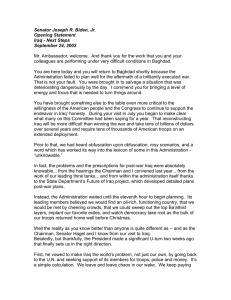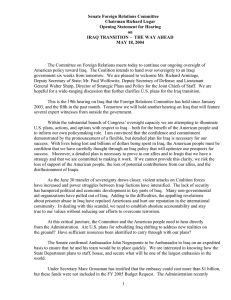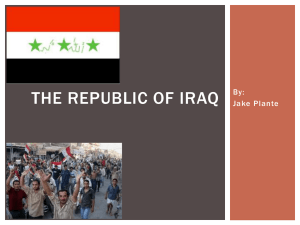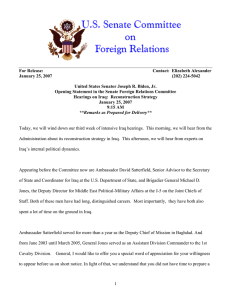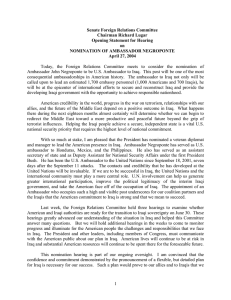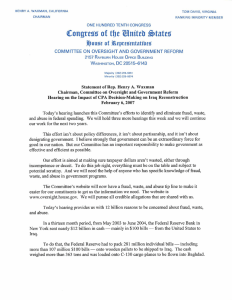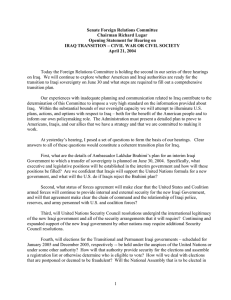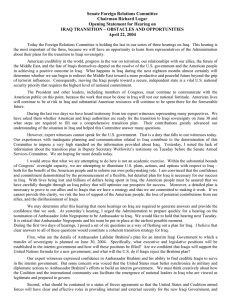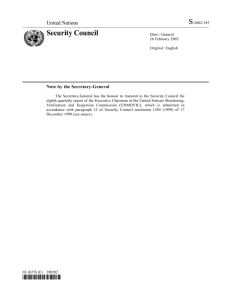Document 10721742
advertisement
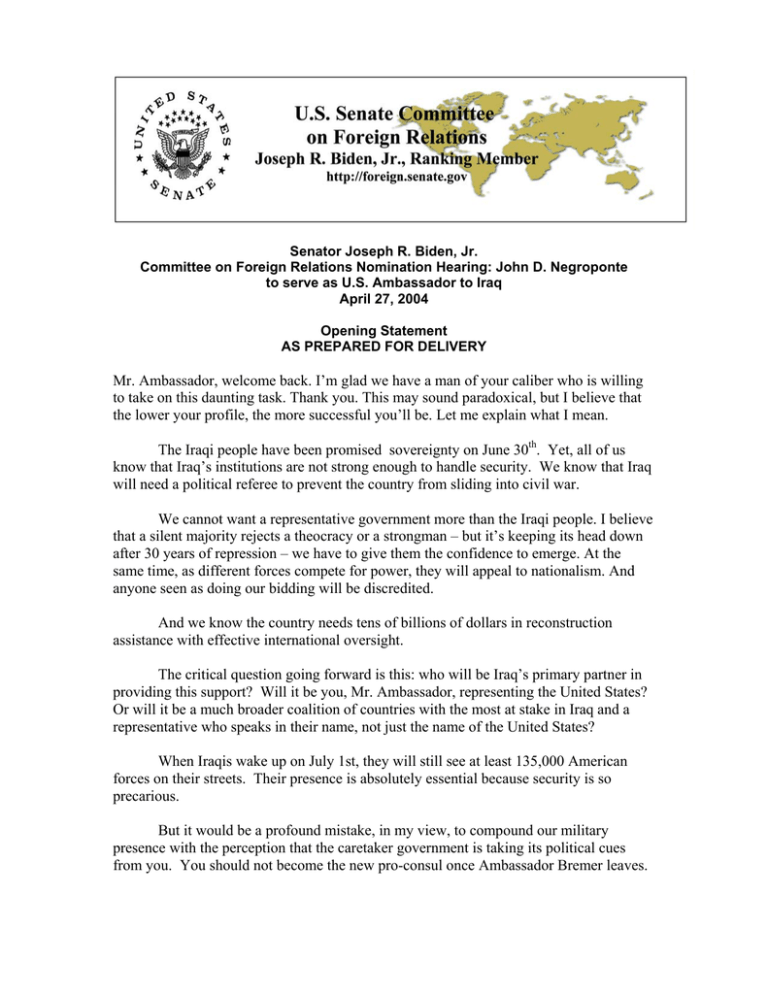
Senator Joseph R. Biden, Jr. Committee on Foreign Relations Nomination Hearing: John D. Negroponte to serve as U.S. Ambassador to Iraq April 27, 2004 Opening Statement AS PREPARED FOR DELIVERY Mr. Ambassador, welcome back. I’m glad we have a man of your caliber who is willing to take on this daunting task. Thank you. This may sound paradoxical, but I believe that the lower your profile, the more successful you’ll be. Let me explain what I mean. The Iraqi people have been promised sovereignty on June 30th. Yet, all of us know that Iraq’s institutions are not strong enough to handle security. We know that Iraq will need a political referee to prevent the country from sliding into civil war. We cannot want a representative government more than the Iraqi people. I believe that a silent majority rejects a theocracy or a strongman – but it’s keeping its head down after 30 years of repression – we have to give them the confidence to emerge. At the same time, as different forces compete for power, they will appeal to nationalism. And anyone seen as doing our bidding will be discredited. And we know the country needs tens of billions of dollars in reconstruction assistance with effective international oversight. The critical question going forward is this: who will be Iraq’s primary partner in providing this support? Will it be you, Mr. Ambassador, representing the United States? Or will it be a much broader coalition of countries with the most at stake in Iraq and a representative who speaks in their name, not just the name of the United States? When Iraqis wake up on July 1st, they will still see at least 135,000 American forces on their streets. Their presence is absolutely essential because security is so precarious. But it would be a profound mistake, in my view, to compound our military presence with the perception that the caretaker government is taking its political cues from you. You should not become the new pro-consul once Ambassador Bremer leaves. 2 Otherwise, we will continue to be viewed as an occupier. We will continue to be blamed for everything that goes wrong. And we will continue to be a target for every malcontent in the country. There must be a fundamental change in the circumstance of the Iraqi people on June 30th. And that change must be for them to see that we are no longer the only ones calling the political shots. So, Mr. Ambassador, that is what I mean when I say that your success will depend on your weakness. We would be wise to work out an arrangement with the major powers and our Arab allies that mandates a Brahimi-like figure to be in Iraq with you and play the role of political referee. We should have the arrangement blessed by the UN Security Council so that we can, as George Will has written “usefully blur the clarity of US primacy.” I, and others on the Committee, have been calling on the President for months to change the model in Iraq so that we take the “American face” off the occupation. There are signs that the Administration is changing course. The President endorsed the efforts of Ambassador Brahimi to establish a caretaker government. The Administration said it will seek a U.N. Security Council resolution that could get the international buy-in we desperately need. We have invited back qualified members of the former Iraqi military and are reversing the indiscriminate implementation of the deBa’athification policy. And the Administration seems to be distancing itself from prominent, but unpopular exile leaders such as Ahmed Chalabi. So, there is hope that we can still get this right. But the President has yet to make clear how he sees our role in Iraq after June 30. Will we finally make Iraq the world’s problem, too? Or will it remain our problem, in the eyes of the Iraqis and in terms of the burden on your shoulders? I hope we can use this hearing to get the answer to this question, and to the many other questions we still have about the Administration’s plan for success in Iraq. Here’s what I hope you will address. First, what role have you been told you will play and what role do you see for yourself, and for the U.S. embassy, post June 30? Will you be a pro-consul, and the embassy the CPA with a new plaque? Or will your role be complementary to that of a senior figure who speaks with the authority of the international community? Second, how do you plan to interact with the Iraqi caretaker government? If it makes a decision we don’t like – for example, about the place of women or the role of the Sharia – will you call them to account? 3 Third, how are discussions going in New York on the so-called “megaresolution?” How will the resolution address the question of balancing Iraq’s sovereignty while retaining freedom of action for American forces? For example, if there is another stand-off in Fallujah or Najaf and the U.S. military wants to intervene but the caretaker government says no, who carries the day? And what is your role in that process? Fourth, on weapons inspections, why are we pressing for the dissolution of UNMOVIC? Why not let UNMOVIC issue its own report after the Iraq Survey Group completes its work? Won’t it be helpful for UNMOVIC to confirm the ISG’s findings? Isn’t the continued existence of UNMOVIC a small price to pay, if that helps us get consensus on a resolution in the UN Security Council? Fifth, with regard to reconstruction, will you have full control over the reconstruction funds, or will a large portion be managed by the Pentagon with only nominal oversight on your part? In other words, who do we hold accountable for how the money is spent? Sixth, how can we best prevent corruption in Iraq, particularly as it relates to our assistance dollars? There are reports that up to 20% of our reconstruction dollars have been lost to corruption. At the same time, as much as 25% of the reconstruction money is going to pay for security for the reconstructors. That means nearly half of the $18.4 billion that we appropriated last year could be lost to security or corruption. Maybe that’s a necessary price but I find it unacceptable. Mr. Chairman, we have a lot of ground to cover and I look forward to the testimony. Mr. Ambassador, again, Thank you. It takes moral, political, and physical courage for you to undertake this responsibility. We owe you a debt of gratitude.

